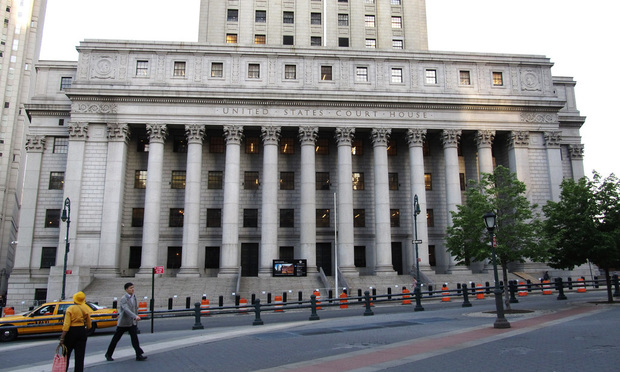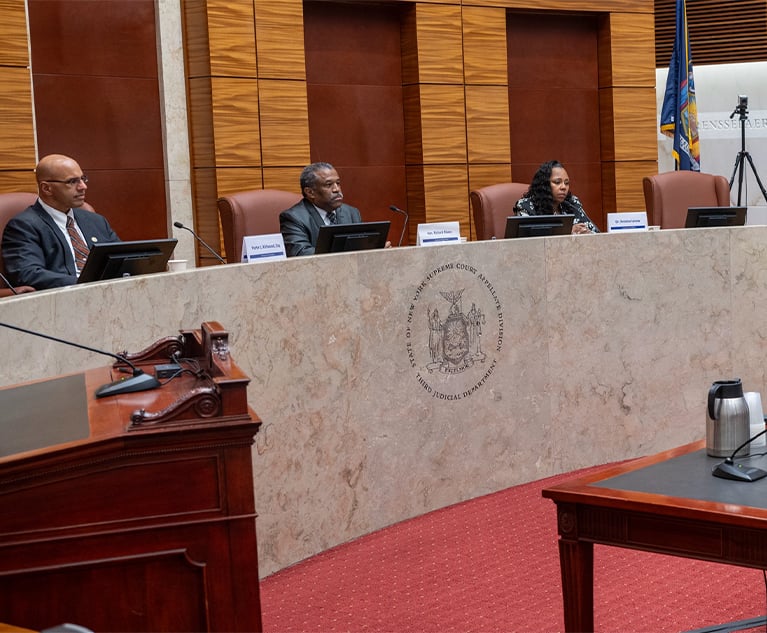2nd Circuit Reaffirms CBA Law, Nods to Sister Circuits in Upholding NLRB Order
The National Labor Relations Board found in 2017 that the health care company HealthBridge Management violated its CBA when it essentially used the end of a subcontractor agreement to gut the benefits of workers forced to reapply for their jobs.
August 23, 2018 at 03:28 PM
3 minute read
 The U.S. Court of Appeals for the Second Circuit and the U.S. District Court for the Southern District of New York. (Photo: Ken Lund)
The U.S. Court of Appeals for the Second Circuit and the U.S. District Court for the Southern District of New York. (Photo: Ken Lund)
The U.S. Court of Appeals for the Second Circuit reaffirmed its position on firms' collective bargaining agreement obligations to employees, while accepting arguments from sister circuits on similar issues, in upholding a National Labor Relations Board finding against health care company HealthBridge Management.
The panel of Circuit Judges Dennis Jacobs and Christopher Droney, with U.S. District Judge Stefan Underhill for the District of Connecticut sitting by designation, declined to review the 2017 NLRB decision against HealthBridge, finding the board's reasoning legally sound. The board sided with workers with the New England Health Care Employees Union who filed unfair labor practice charges in 2012.
In 2009, a subcontractor for HealthBridge took over management and payroll responsibilities over a few dozen housekeeping workers at three of the company's health centers. Based on the contract with HealthBridge, the union was assured its workers would retain benefits, seniority and job status. However, once the subcontractor's contract ran out, the workers it had supervised were told they were out of jobs and would have to reapply. Almost all were rehired, but at lower wages, with fewer benefits and without accrued seniority.
When the workers protested the new arrangement, a HealthBridge administrator threatened to call the police for those who refused to sign on or leave. According to the court, 45 of the 48 offered to be rehired were, almost all of whom did so within 48 hours.
The circuit panel, in upholding the board's remedial order against HealthBridge, affirmed its finding that an employer may not use a short-term operational change to get around its contract agreements with a union. Circuit law, the panel noted, supported this conclusion against a “disguised continuance” of operations meant to undercut a CBA. Circuit law specifically prevents employers from disregarding contracted seniority status, even if employees are shifted onto the payroll of another entity.
The panel pointed to other circuits' ruling in the same area, which supported the workers' claims. Specifically, the panel pointed to the Tenth Circuit's decision in 2000's NLRB v. F&A Food Sales, which shared a number of the features of the HealthBridge case. This and other decisions that support, like the Second Circuit does, barring employers from using short-term operation changes to subvert CBAs supplement the circuit's own findings, the panel noted.
“The obligations that HealthBridge attempted to shed remained binding, and no reasonable reading of those obligations permitted HealthBridge to eliminate the seniority-based entitlements of its housekeeping workers as it did,” the panel wrote.
A spokesman for the National Labor Relations Board declined to comment on the panel's decision.
Fisher & Phillips co-regional managing partner Brian Gershengorn led HealthBridge's legal team on appeal. He did not respond to a request for comment.
This content has been archived. It is available through our partners, LexisNexis® and Bloomberg Law.
To view this content, please continue to their sites.
Not a Lexis Subscriber?
Subscribe Now
Not a Bloomberg Law Subscriber?
Subscribe Now
NOT FOR REPRINT
© 2025 ALM Global, LLC, All Rights Reserved. Request academic re-use from www.copyright.com. All other uses, submit a request to [email protected]. For more information visit Asset & Logo Licensing.
You Might Like
View All

Law Firms Expand Scope of Immigration Expertise Amid Blitz of Trump Orders
6 minute read
'Reluctant to Trust'?: NY Courts Continue to Grapple With Complexities of Jury Diversity
Trending Stories
- 1How Some Elite Law Firms Are Growing Equity Partner Ranks Faster Than Others
- 2Fried Frank Partner Leaves for Paul Hastings to Start Tech Transactions Practice
- 3Stradley Ronon Welcomes Insurance Team From Mintz
- 4Weil Adds Acting Director of SEC Enforcement, Continuing Government Hiring Streak
- 5Monday Newspaper
Who Got The Work
J. Brugh Lower of Gibbons has entered an appearance for industrial equipment supplier Devco Corporation in a pending trademark infringement lawsuit. The suit, accusing the defendant of selling knock-off Graco products, was filed Dec. 18 in New Jersey District Court by Rivkin Radler on behalf of Graco Inc. and Graco Minnesota. The case, assigned to U.S. District Judge Zahid N. Quraishi, is 3:24-cv-11294, Graco Inc. et al v. Devco Corporation.
Who Got The Work
Rebecca Maller-Stein and Kent A. Yalowitz of Arnold & Porter Kaye Scholer have entered their appearances for Hanaco Venture Capital and its executives, Lior Prosor and David Frankel, in a pending securities lawsuit. The action, filed on Dec. 24 in New York Southern District Court by Zell, Aron & Co. on behalf of Goldeneye Advisors, accuses the defendants of negligently and fraudulently managing the plaintiff's $1 million investment. The case, assigned to U.S. District Judge Vernon S. Broderick, is 1:24-cv-09918, Goldeneye Advisors, LLC v. Hanaco Venture Capital, Ltd. et al.
Who Got The Work
Attorneys from A&O Shearman has stepped in as defense counsel for Toronto-Dominion Bank and other defendants in a pending securities class action. The suit, filed Dec. 11 in New York Southern District Court by Bleichmar Fonti & Auld, accuses the defendants of concealing the bank's 'pervasive' deficiencies in regards to its compliance with the Bank Secrecy Act and the quality of its anti-money laundering controls. The case, assigned to U.S. District Judge Arun Subramanian, is 1:24-cv-09445, Gonzalez v. The Toronto-Dominion Bank et al.
Who Got The Work
Crown Castle International, a Pennsylvania company providing shared communications infrastructure, has turned to Luke D. Wolf of Gordon Rees Scully Mansukhani to fend off a pending breach-of-contract lawsuit. The court action, filed Nov. 25 in Michigan Eastern District Court by Hooper Hathaway PC on behalf of The Town Residences LLC, accuses Crown Castle of failing to transfer approximately $30,000 in utility payments from T-Mobile in breach of a roof-top lease and assignment agreement. The case, assigned to U.S. District Judge Susan K. Declercq, is 2:24-cv-13131, The Town Residences LLC v. T-Mobile US, Inc. et al.
Who Got The Work
Wilfred P. Coronato and Daniel M. Schwartz of McCarter & English have stepped in as defense counsel to Electrolux Home Products Inc. in a pending product liability lawsuit. The court action, filed Nov. 26 in New York Eastern District Court by Poulos Lopiccolo PC and Nagel Rice LLP on behalf of David Stern, alleges that the defendant's refrigerators’ drawers and shelving repeatedly break and fall apart within months after purchase. The case, assigned to U.S. District Judge Joan M. Azrack, is 2:24-cv-08204, Stern v. Electrolux Home Products, Inc.
Featured Firms
Law Offices of Gary Martin Hays & Associates, P.C.
(470) 294-1674
Law Offices of Mark E. Salomone
(857) 444-6468
Smith & Hassler
(713) 739-1250







